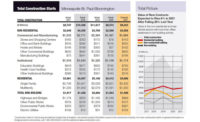July 2023 City Scoop: Minneapolis
City Grill

Sara Hage
Associate Vice President
HNTB
Minnesota Gov. Tim Walz just signed a historic infrastructure bill that will increase funding across the state. It includes significant funding for passenger rail and transit service in the region. With this, and funding provided through the federal Infrastructure Investment and Jobs Act, local cities and counties are working to advance their capital programs.
Currently, several key infrastructure projects are under construction in the Twin Cities, including Southwest Light Rail Transit; the Third Avenue Bridge rehabilitation in Minneapolis; I-494 from the airport to Highway 169 design-build; and Gold Line BRT from St. Paul to Woodbury.
Workforce development remains a key issue for the transportation industry in the region, with needs from bus drivers to construction workers to engineers. Additionally, there is an ongoing need to develop and enhance worker skills and processes related to technology and safety.
This year the Minnesota Legislature also passed bipartisan capital investment bills totaling $2.6 billion. This is the largest bonding bill to date.
Additionally, an omnibus transportation bill creates new revenue streams to increase dedicated funding for state transportation projects. Over the next 4 years, it will provide $3.8B in ongoing dedicated revenue.
The combination of these revenue streams will keep construction of transportation infrastructure busy in the coming years.
HNTB is a part of the team partnering with the Minnesota Department of Transportation on the rehabilitation of the Third Avenue Bridge in downtown Minneapolis. Originally opened in 1918 and listed on the National Registry of Historic Places, the ongoing rehabilitation will help ensure its service life is extended and continue its role as a key point of transport of people and goods in Minneapolis. The bridge is anticipated to open in this fall.
HNTB also is serving as program management consultant from planning to construction on the Metro Transit Gold Line BRT project. Anticipated to begin revenue service in 2025, this line will connect communities along a 10-mile corridor from St. Paul to Woodbury.

